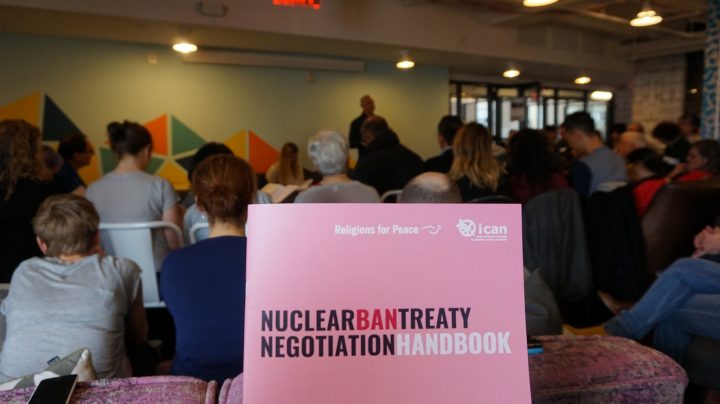By Ray Acheson for Reaching Critical Will.
Today we begin negotiations of a treaty banning nuclear weapons. It took incredible determination, creativity, and courage to get here. We have seen decades of activism against the bomb. Endless engagement with nuclear-armed states. The collection of baby teeth. Millions of people marching in the streets. Commitments made and broken. Pleas from survivors of nuclear weapons use and testing. Many, many conversations in various UN forums. Countless UN resolutions. Multiple joint statements. Three humanitarian impact conferences. Two open-ended working groups. One Humanitarian Pledge. And then, the adoption of an historic resolution in the UN General Assembly last October.
We also know the opposition we’ve faced. The nuclear-armed states have hurled vitriol at governments and NGOs championing this process. They have ordered allies not to attend, they have accused us of undermining existing international law and sending international relations into chaos, and they have even suggested these negotiations might lead to the use of nuclear weapons—presumably out of spite.
Nevertheless, we persisted. And today at the UN, we make history. It is historic because these negotiations symbolise a fundamental shift in the power dynamics behind nuclear weapons—a challenge to an unjust international system. That itself is a victory.
Hard work is still ahead of us, of course. We must now move to details and decisions. We are tasked with developing a strong treaty that stigmatises and categorically prohibits the most dangerous weapon ever created in order to facilitate actual change in the policies and practices of states that have so far perpetuated global injustice and the spectre of mass extinction by supporting nuclear weapons.
While it may seem daunting, fulfilling this task is fully within our means. In theory, it is an obvious thing to ban something so abhorrent. We have banned chemical and biological weapons, landmines and cluster munitions, and we even preemptively banned blinding laser weapons. We did this even without the support of users and producers of some of these weapons. We are motivated by the catastrophic humanitarian consequences of nuclear weapons, the risk of their use, and the deplorable waste of resources currently being sunk into the on-going arms race. We understand the global injustice these weapons represent, and we are morally, ethically, and legally compelled to categorically prohibit these weapons of mass destruction once and for all.
States will spend this week putting forward their views on what the treaty should contain. Civil society groups with the International Campaign to Abolish Nuclear Weapons (ICAN), which is largely responsible for shepherding this process alongside governments, have some ideas of what states should consider. ICAN has put out four briefing papers for governments to consider ahead of negotiations. The Women’s International League for Peace and Freedom (WILPF), an ICAN partner and member of the campaign’s international steering group, put out a longer discussion paper on the principles and elements of a nuclear weapon ban treaty. It looks at how this instrument could build on existing norms and reinforce existing legal instruments but also strengthen the rejection and stigmatisation of these weapons. Civil society will also provide views this week in working papers, interventions to the conference, and side events.
The treaty banning nuclear weapons is born of humanitarian and environmental concerns. Its principles, objectives, prohibitions, and positive obligations will need to reflect this. This is an opportunity for governments that reject nuclear weapons to change the way nuclear weapons are treated in law, politics, economics, and in the eye of the public. Thus above all else, it is imperative that this treaty makes all aspects of the possession, use, threat of use, or preparation for use of nuclear weapons categorically illegal, without exception, in order to help propel us towards a nuclear weapon free world.
It is a moment to celebrate, and we must throw our determination and creativity now into developing the strongest ban treaty possible. It’s an exciting time and the world is ready! Let’s ban the bomb.






